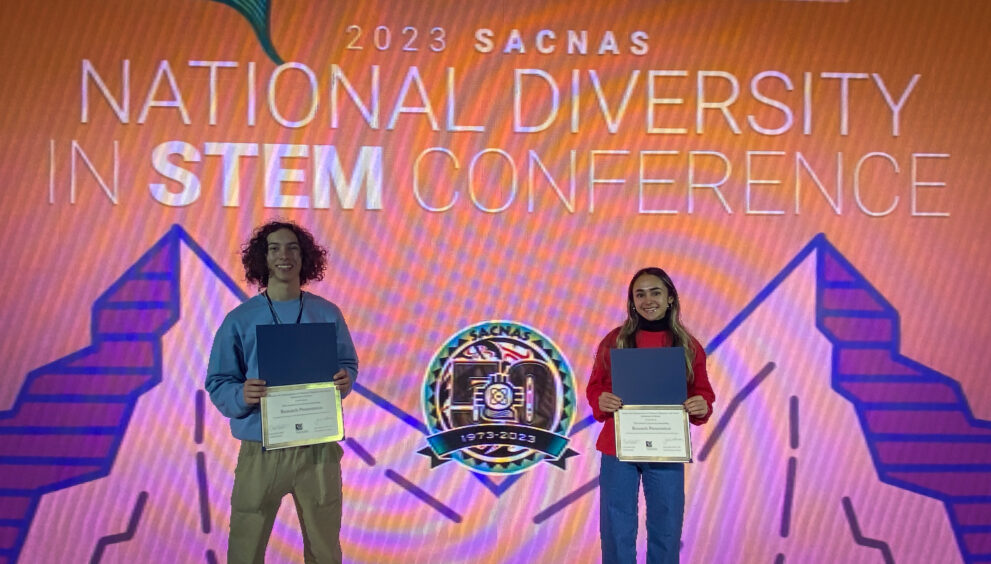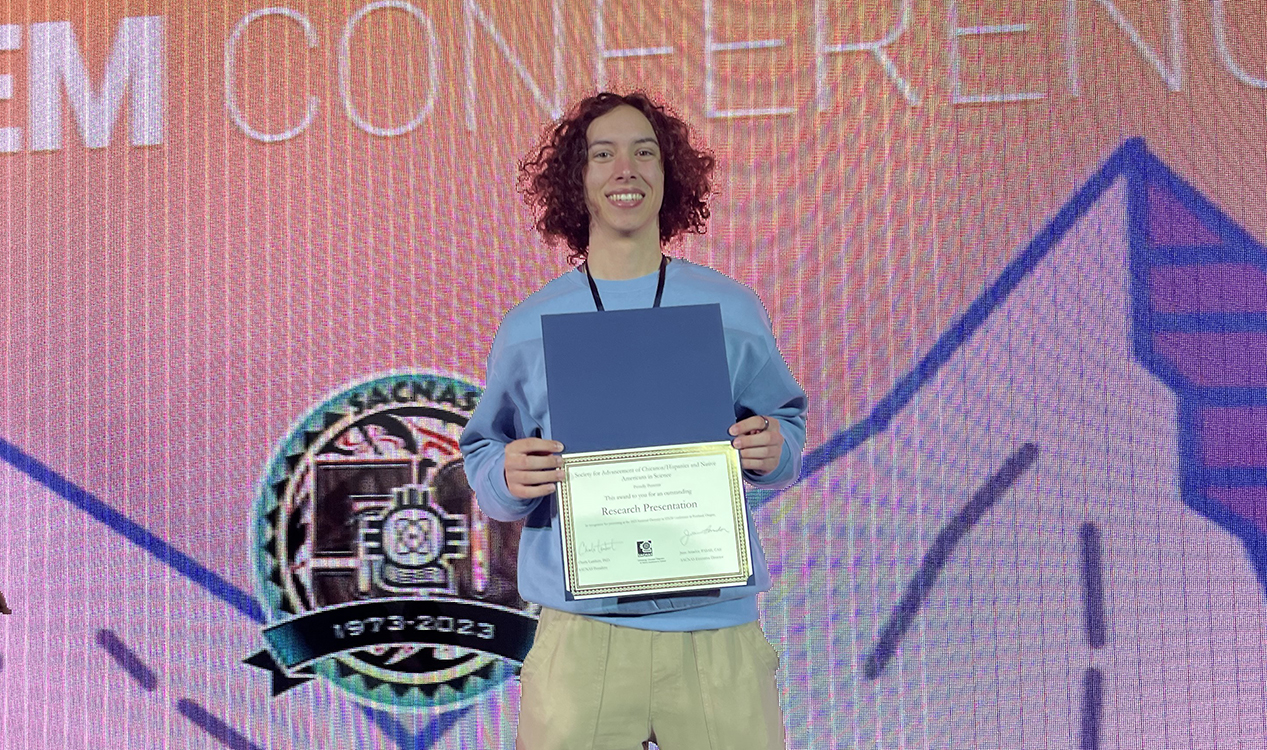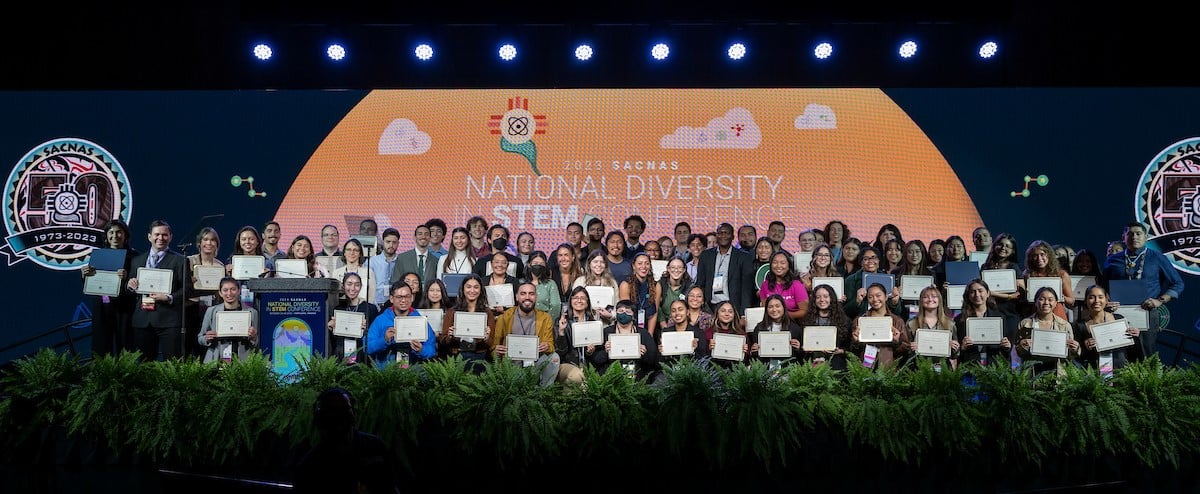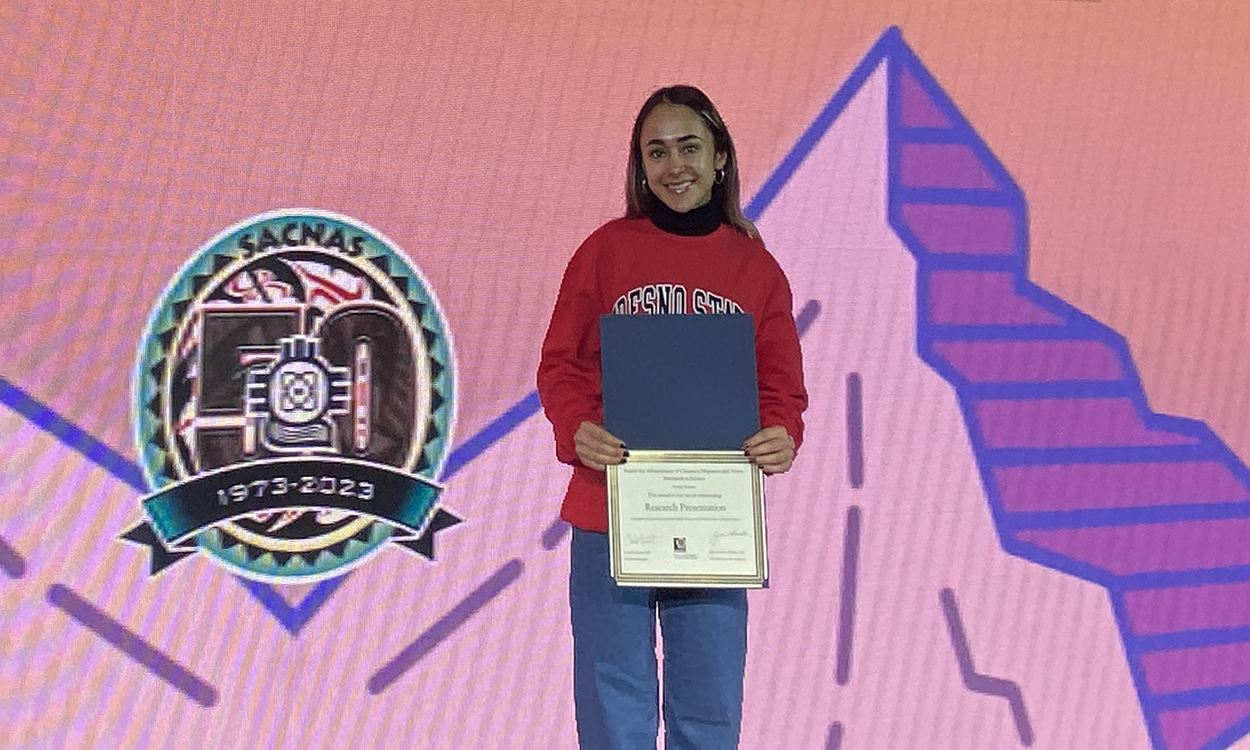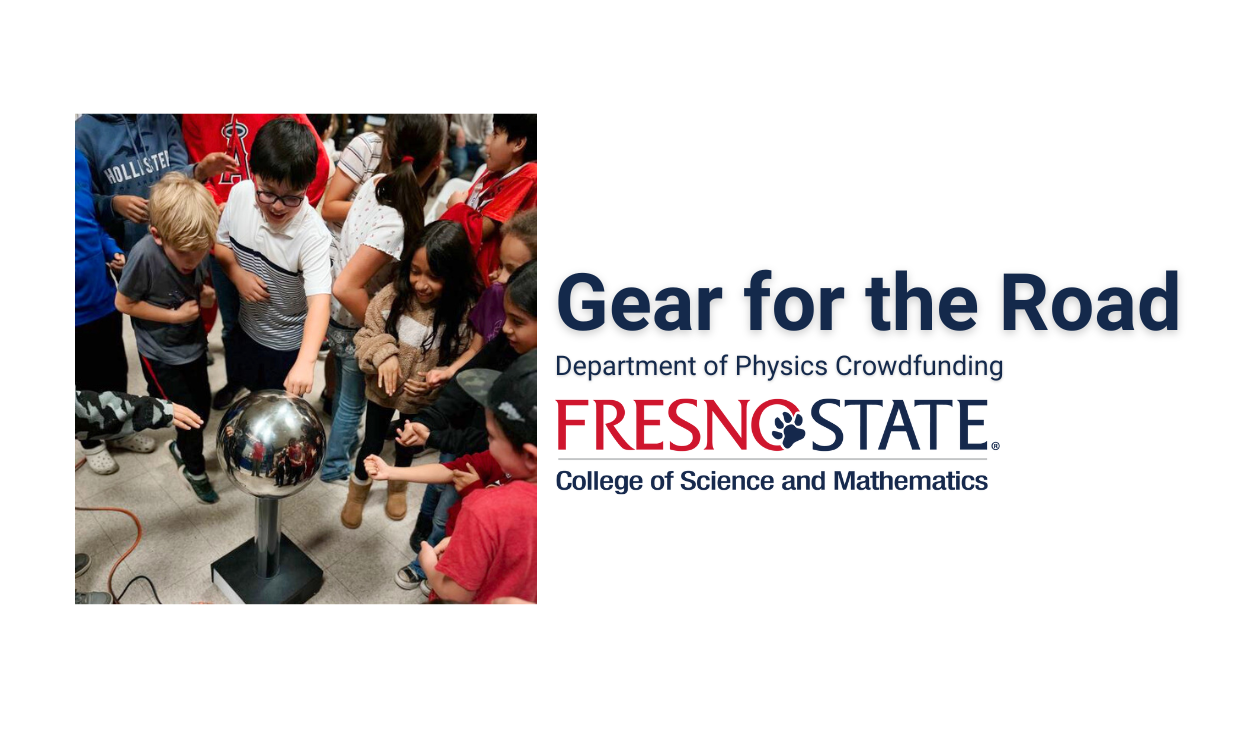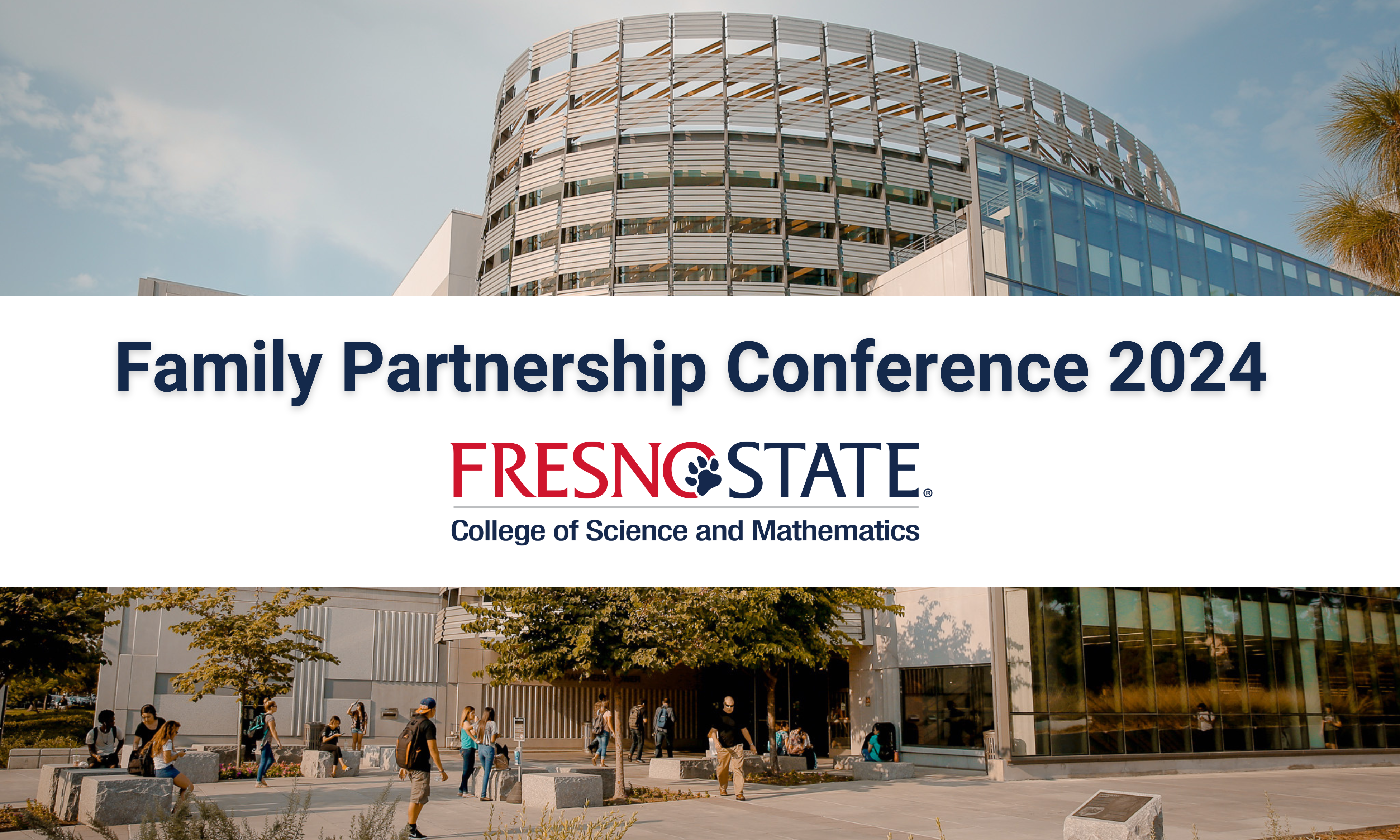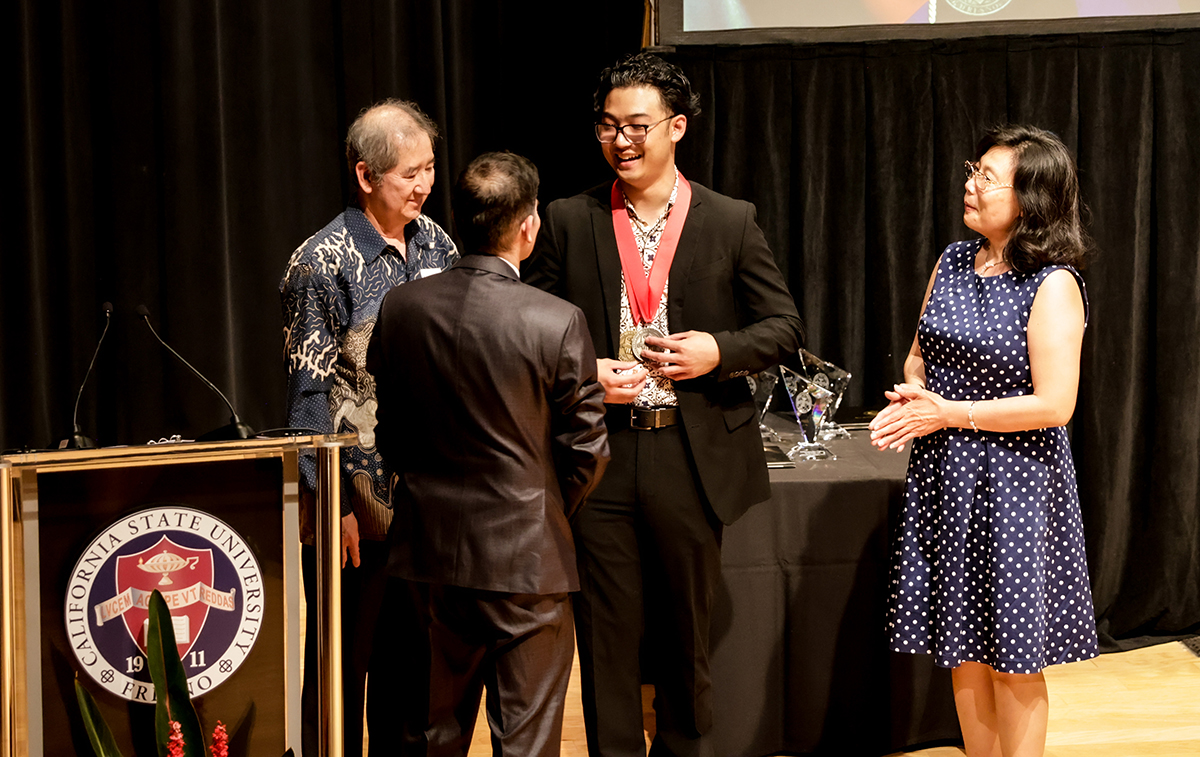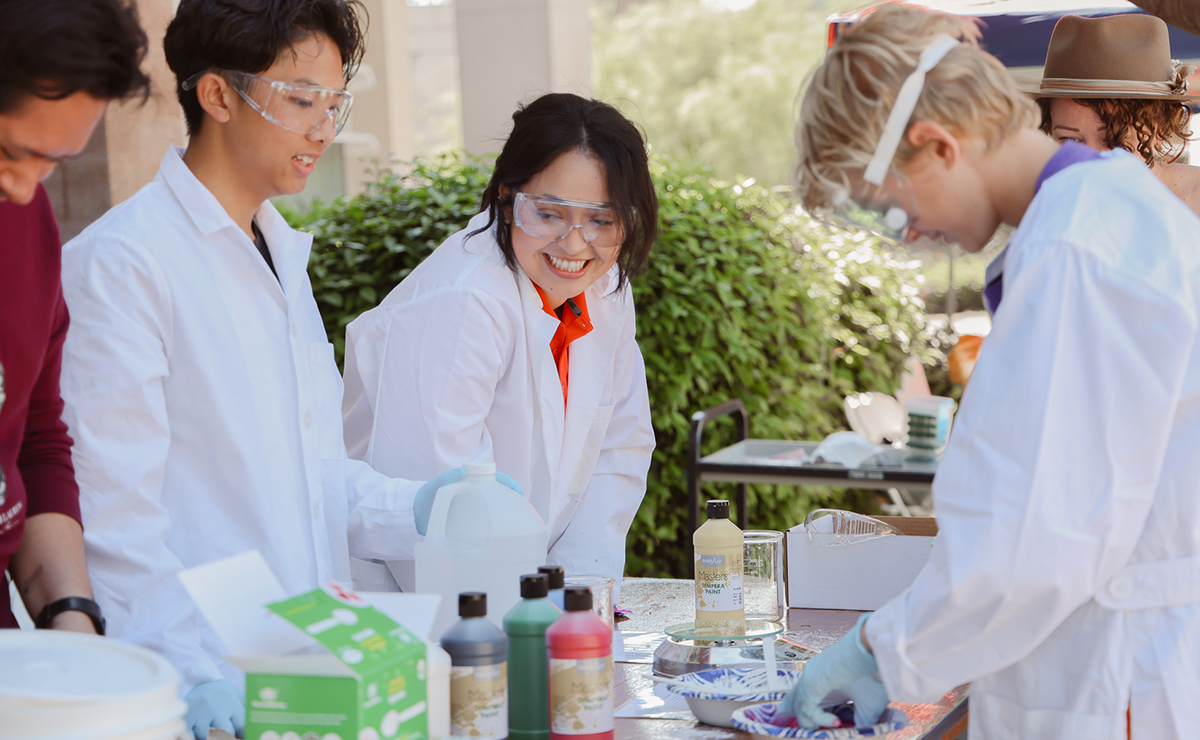Physics major Benjamin Awad and Keyara Piri, a biology major, won top awards for their presentations at the just-concluded 2023 SACNAS National Diversity in STEM Conference held in Portland, Oregon.
SACNAS, the Society for Advancement of Chicanos / Hispanic and Native Americans in Science, is a non-profit organization founded in 1973 to reverse the underrepresentation of Chicano and Native American professionals in academia and government agencies.
Awad, received recognition for a presentation entitled microdistribution of major and trace elements in baby teeth slices using a microbeam 2D XRF raster scanning technique.
The study examined baby teeth to learn about a baby’s health and exposure to harmful substances.
Piri’s presentation entitled Synthesis of dehydroabietylamine derivatives as potential androgen receptor N-terminal domain antagonists.
The research focuses on creating new compounds that can potentially stop the growth of prostate cancer cells, particularly those driven by a specific protein known as androgen receptor.
Awad research seeks to make things easier in dental studies.
“The research project that Dr. Mihai Gherase and I are working on concerns the application of a table-top x-ray microbeam (approximately 25 microns) to measure absolute concentrations and microscopic distributions of chemical elements in a primary incisor tooth slice,” Awad said.
A micron is a unit of length roughly equal to one millionth of a meter.
“This award means a lot to me. As a pre-medical student who is deep into the application cycle, this experience reaffirmed my suspicions that I enjoy research just as much as I enjoy medicine,” Keyara Piri, biology major.
Awad’s research has valuable real-life applications.
“Such data can be used to assess dietary habits, nutritional deficiencies, and potential exposures of harmful elements to children,” Awad said.
Piri’s abstract highlights the gravity of prostate cancer’s impact on men in the US.
“Prostate cancer is one of the deadliest cancers among men in the United States, responsible for roughly 34,700 deaths in 2022,” Piri said in her abstract.
In her presentation, Piri, a Smittcamp Honor’s College scholar, argued that even with currently available treatments, the disease can develop into castration-resistant prostate cancer (CRPC), which can worsen if the androgen receptor (AR) starts working again to control the genes in our cells.
“Our experiments showed that these compounds can slow the growth of prostate cancer cells that have the AR protein,” Piri concluded in her abstract.
These compounds were developed and tested to see if they could target and slow down the growth of these cancer cells while sparing normal cells.
Piri said she enjoyed the experience because it allowed her to share scientific knowledge and research with her peers.
“This award means a lot to me,” Piri said. “As a pre-medical student who is deep into the application cycle, this experience reaffirmed my suspicions that I enjoy research just as much as I enjoy medicine.”
She added that the SACNAS experience also boosted her confidence in applying to Ph.D. programs.
Dr. Gherase, a physics professor at Fresno State and the principal investigator (PI) in Awad’s research, described him as an outgoing personality who is “enthusiastic about research, always willing to learn, and very invested in his career.”
Gherase said he gave Awad a piece of simple advice.
“Practice, practice, practice, along with some details such as: “don’t prepare too many slides (for talks)” and “keep them as simple and visually appealing as possible,” Gherase said.
Gherase’s advice paid off after four previous attempts. The professor noted that Awad’s presentation stood out because he used a small and affordable X-ray machine to closely examine teeth, which differs from most studies that used big and expensive machines called synchrotrons. Using table-top X-ray systems could make it easier to study teeth in the future.
“The feeling of knowing that the research that I conducted with my PI, Dr. Gherase, won an award made me feel a sense of completion, although our research project is not yet completed,” Benjamin Awad, physics major.
Piri’s research, which also credited biochemistry major Seiji Shinkawa, was conducted with guidance from Dr. Qiao-Hong Chen, a biochemistry professor who also serves as the graduate coordinator for the chemistry and biochemistry department.
More than 10 Fresno State students participated in this year’s conference.
Click this link to view a list of all the winners.
Piri is listed under chemistry winners, and Awad’s name appears under physics and astronomy winners.
Piri, who is minoring in chemistry and Italian, and Awad, a junior at Fresno State minoring in mathematics, stand out among their peers as promising scientists at CSM.
Awad, a Smittcamp Family Honors College President Scholar, said the experience was “intimidating at first.”
“It was my first time at a national conference, but my 4th conference overall,” Awad said. “I would highly recommend everybody at some point in their life to conduct research as a student.”
Awad reflected on their achievements.
“The feeling of knowing that the research that I conducted with my PI, Dr. Gherase, won an award made me feel a sense of completion, although our research project is not yet completed,” Awad concluded.
To future researchers, Piri has two words of advice. “Do it.”
“Get started early. We all start out clueless and lost,” Piri said. “The journey is worth it as the skills that research teaches you cannot be learned in the classroom.”
Special thank you
Awad and Piri shared their gratitude to the programs that have supported them through their research and studies at Fresno State. The scholars singled out the Research Training Initiative for Scientific Enhancement Program (RISE), Cal Bridge, and Smittcamp Family Honors College, among others, as key to their success.
“The RISE program supports students like me through funding, mentorship, and advising. They help navigate the road to a Ph.D. Without their support, I would not be able to attend conferences like SACNAS,” Keyara said.
Awad shared his appreciation for all the programs.
“All three of these programs have significantly helped me get involved in research on campus, understand my research better, support me financially when presenting, and offer mentorship when it comes to any academic hurdle that I run into,” Awad said.
